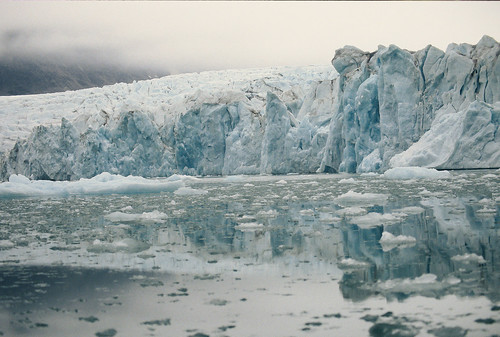A New 38-Year Record Reveals Widespread Retreat Of Glaciers On Svalbard
by Anna Sinisalo and Oda Mulelid | Published: 07-Feb-25 | Last updated: 07-Feb-25 | Tags : svalbard | category: PRESS RELEASE
New study published in Nature discusses the critical role of air-ice-ocean interactions in shaping Arctic glacier dynamics. The research provides vital insights into the future of mass loss in the rapidly warming Arctic.
“We found that 91% of the glaciers we studied have been retreating significantly across Svalbard since 1985, with the fastest rates happening in recent years, likely caused by extreme climate anomalies,” says Tian Li, from Bristol Glaciology Centre of the University of Bristol, who led the research.

Tian Li, the lead author of the study. Photo by Yi Wang
By analysing 124,919 calving front positions for 149
marine-terminating glaciers using advanced deep learning techniques, the study
offers an unparalleled high-resolution view of glacier behaviour over nearly
four decades.
“This is the first time that we have examined the glacier calving in Svalbard on such a large scale, thanks to the recent advances in artificial intelligence which enables us to analyze millions of satellite images quickly.”

Marine-terminating glacier in Svalbard. Photo
by Peter Prokosch.
The research team found that 62% of these glaciers experienced seasonal cycles in calving front retreats, with immediate responses of glacier retreats to seasonal ocean warming demonstrating clear sensitivity to rising atmospheric and oceanic temperatures.
In a related study, the Norwegian Polar Institute and its partners have observed an immediate response from glacier retreat to seasonal ocean warming measured with an ocean rig. Together, these results show that Arctic glaciers have a strong sensitivity to rising ocean temperatures, which has not been taken into account in predictions of future glacier changes and contributions to sea level rise.
The new study warns
that future calving front retreats are likely to intensify under continued
warming, potentially doubling mass loss by 2100. Despite these alarming trends,
significant uncertainties remain in predicting the behaviour of
marine-terminating glaciers. The team is continuing
their work to understand the calving mechanisms for all marine-terminating
glaciers across the Arctic.
Contact: Tian Li, email: tian.li@bristol.ac.uk
Full reference: Li,
T., Hofer, S., Moholdt, G. et al. Pervasive glacier
retreats across Svalbard from 1985 to 2023. Nat Commun 16, 705 (2025). https://doi.org/10.1038/s41467-025-55948-1
